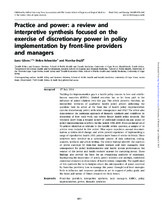| dc.contributor.author | Gilson, Lucy | |
| dc.contributor.author | Orgill, Marsha | |
| dc.contributor.author | Schneider, Helen | |
| dc.date.accessioned | 2015-09-17T11:47:32Z | |
| dc.date.available | 2015-09-17T11:47:32Z | |
| dc.date.issued | 2014 | |
| dc.identifier.citation | Gilson, L., Orgill, M., Schneider, H. (2014). Practice and power: a review and interpretive synthesis focused on the exercise of discretionary power in policy implementation by front line providers and managers. Health Policy and Planning, 29:iii51–iii69 | en_US |
| dc.identifier.issn | 0268-1080 | |
| dc.identifier.uri | http://hdl.handle.net/10566/1617 | |
| dc.description.abstract | Tackling the implementation gap is a health policy concern in low- and middleincome
countries (LMICs). Limited attention has so far been paid to the influence of power relations over this gap. This article presents, therefore, an interpretive synthesis of qualitative health policy articles addressing the question: how do actors at the front line of health policy implementation exercise discretionary power, with what consequences and why? The article also demonstrates the particular approach of thematic synthesis and contributes to discussion of how such work can inform future health policy research. The synthesis drew from a broader review of published research on any aspect of policy implementation in LMICs for the period 1994–2009. From an initial set of 50 articles identified as relevant to the specific review question, a sample of 16
articles were included in this review. Nine report experience around decentralization,
a system-level change, and seven present experience of implementing a
range of reproductive health (RH) policies (new forms of service delivery). Three
reviewers were involved in a systematic process of data extraction, coding,
analysis, synthesis and article writing. The review findings identify: the practices
of power exercised by front-line health workers and their managers; their
consequences for policy implementation and health system performance; the
sources of this power and health workers’ reasons for exercising power. These
findings also provide the basis for an overarching synthesis of experience,
highlighting the importance of actors, power relations and multiple, embedded
contextual elements as dimensions of health system complexity. The significance
of this synthesis lies in its insights about: the micropractices of power exercised
by front-line providers; how to manage this power through local level strategies
both to influence and empower providers to act in support of policy goals; and
the focus and nature of future research on these issues. | en_US |
| dc.language.iso | en | en_US |
| dc.publisher | Oxford University Press | en_US |
| dc.rights | Copyright (2014) of this publication is assigned to the authors; all rights reserved. | |
| dc.source.uri | http://dx.doi.org/10.1093/heapol/czu098 | |
| dc.subject | Front-line | en_US |
| dc.subject | Interpretive synthesis | en_US |
| dc.subject | Local managers | en_US |
| dc.subject | Policy implementation | en_US |
| dc.subject | Power | en_US |
| dc.subject | Thematic synthesis | en_US |
| dc.subject | LMICs | en_US |
| dc.title | Practice and power: a review and interpretive synthesis focused on the exercise of discretionary power in policy implementation by front line providers and managers | en_US |
| dc.type | Article | en_US |
| dc.privacy.showsubmitter | false | |
| dc.status.ispeerreviewed | true | |
| dc.description.accreditation | Web of Science | en_US |

